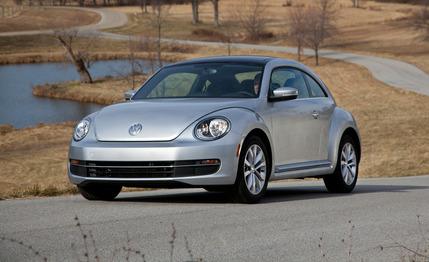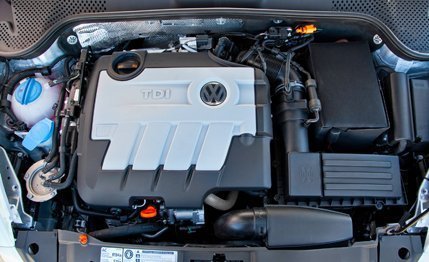 Instrumented Test
Instrumented Test

Counterculture cuteness notwithstanding, the original Beetle was all about operational thrift, so what could be more appropriate than a renewal Beetle that does the same?
In the modern Beetle, pairing VW’s torquey 2.0-liter turbo-diesel with a six-speed manual delivers EPA-assessed mpg numbers of 28 mpg in the urbs, 41 on the open road. (The DSG automatic sacrifices 3 mpg on the highway.) We actually did a better than either figure, recording a whopping 45 mpg on a driving diet that included some suburban streets and a lot of country roads.

This is rare for us; we have a tendency to underperform in terms of EPA forecasts. But there’s something about driving a little turbo-diesel that makes the operator want to stretch the gallons. Indeed, watching the onboard fuel computer had us wanting to coax the consumption number upward, which requires a light foot on the throttle. The same technique is required to get the most out of hybrids, of course, and their elaborate dashboard eco-coaches are seductive. But the Beetle TDI is a different experience, thanks to its torque, so keeping the engine at low rpm doesn’t feel like as much of a sacrifice in everyday driving.
The Heart
At this point, some of you might be thinking you’ve seen this script before. You have: VW offered a turbo-diesel option in the New Beetle from 1998 to 2006. But this is a different Beetle—longer, lower, wider, sleeker—with a different diesel.

The earlier 1.9-liter diesel was an older type that lacked the efficiency of common-rail technology, with its immense pressures and cleaner operation. Paired with a five-speed manual transmission, the 1.9’s final EPA ratings were 31 mpg city and 40 highway. The new TDI four has a larger total displacement—72 cc, to be exact—thanks to a cylinder-bore increase of 1.5 mm. More displacement plus improved fuel delivery adds up to more power, which means 140 hp from the 2.0 versus 100 from the 1.9, and 236 lb-ft of torque versus 177.
It’s worth noting that this newer TDI will itself become an older TDI when it’s replaced by a new engine family code-named EA288. (The all-new 2014 Golf will adopt the new engine.) The 2.0-liter version of the EA288 we’ll see in the States will get a huge jump in output, to 190 hp and 280 lb-ft, although it will require urea injection—a measure VW has managed to avoid with the Golf and Beetle TDI so far—to meet steadily tightening emissions standards. The current engine just clears current regulations, thanks to its combination of exhaust gas recirculation, a particulate filter, and three catalytic converters to deal with hydrogen sulfide, oxidation, and oxides of nitrogen.
No Hurry
Although diesels have dominated at the Le Mans 24-hour race in recent years, their street reputation is for mpg, not mph. (One could argue, however, that their greater efficiency compared with gasoline race engines has made their race reputation, too.) If the latest Beetle shape is appealing but your objective is haste, we suggest the 200-hp, 2.0-liter gas-burning turbo four. Equipped with VW’s dual-clutch automated manual gearbox (DSG), one such Beetle we tested hit 60 mph in 6.3 seconds and covered the quarter-mile in 15 seconds at 95 mph.